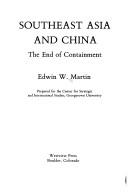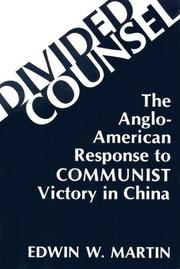| Listing 1 - 4 of 4 |
Sort by
|

ISBN: 0891582193 Year: 1977 Publisher: Boulder Westview Press
Abstract | Keywords | Export | Availability | Bookmark
 Loading...
Loading...Choose an application
- Reference Manager
- EndNote
- RefWorks (Direct export to RefWorks)
820 Internationale Betrekkingen --- 831.1 Handelspolitiek --- 838 Duurzame Ontwikkeling --- 841 Politiek Bestel --- 855.1 Strategie --- 858.1 Politiek geweld --- 882.4 Noord-Amerika --- 883 Azië --- 883.2 Oost-Azië --- 883.3 Zuidoost-Azië --- 884.1 Oost-Europa --- China --- Southeast Asia --- United States --- Foreign relations

ISBN: 0813149711 9780813149714 0813115914 9780813115917 0813192927 Year: 1986 Publisher: Lexington, Kentucky : University Press of Kentucky,
Abstract | Keywords | Export | Availability | Bookmark
 Loading...
Loading...Choose an application
- Reference Manager
- EndNote
- RefWorks (Direct export to RefWorks)
In the long controversy over the failure of the United States to extend early recognition to the People's Republic of China, the story of American efforts to maintain an official presence in the Communist-controlled areas of China until 1950 has been largely neglected. Moreover, the often bitter partisan strife over Sino-American relations during this period has obscured important facts or so distorted them that making an independent judgment is difficult indeed. In this book, Edwin Martin seeks to set the confused record straight by providing a well-documented, detailed account of American re
Taiwan --- Great Britain --- United States --- China --- Taiwan Sheng zheng fu --- Tʻai-wan sheng cheng fu --- Taiwan xing zheng zhang guan gong shu --- Tʻai-wan hsing cheng chang kuan kung shu --- Taiwan Sheng xing zheng zhang guan gong shu --- Tʻai-wan sheng hsing cheng chang kuan kung shu --- Tʻai-wan --- Taĭvan --- Formosa --- Taiwan Sōtokufu --- Government-General of Taiwan --- Taiwan sheng --- Tʻai-wan sheng --- Taiwan Provincial Government --- Taiwan zong du fu --- Tʻai-wan tsung tu fu --- Xiaoliuqiu --- 臺灣 --- 台灣 --- Тайвань --- Tajvan --- Тайуан --- Taĭuan --- Tayiwani --- Taywan --- Taivanas --- Taiwana --- Taihuan --- Тайван --- China (Republic : 1949- ) --- Foreign relations --- History
Book
ISBN: 1000312305 1000240428 0429306776 Year: 2019 Publisher: London : Routledge, Taylor & Francis Group,
Abstract | Keywords | Export | Availability | Bookmark
 Loading...
Loading...Choose an application
- Reference Manager
- EndNote
- RefWorks (Direct export to RefWorks)
Since the end of the war in Vietnam and the withdrawal of the American presence there, a marked realignment of power has taken place in Southeast Asia. The old rivalry between China and the United States has become a relationship of cautious rapprochement, while Sino-Soviet competition has been intensified by China's fear that the USSR will move to fill the power vacuum created by the U.S. departure. The United States no longer perceives a friendly Sino-Southeast Asian relationship to be as much of a danger to its security interests as it once did, but how that relationship develops remains of considerable importance to this country. In this book, Edwin Martin examines some of the principal factors in China's current relations with the Southeast Asian countries-- China's domestic policies, Peking-oriented insurgency in Southeast Asian countries, the Overseas Chinese, trade considerations, the policies of third powers--and concludes that the newly emergent nationalism in Southeast Asia,coupled with Sino-Soviet rivalry, indeed diminishes the threat posed by a Communist Indochina and calls for a U.S. policy of encouraging stable relations in the area, both among the countries themselves and between them and the PRC. He asserts that a four-way balance of power-- involving the United States, the USSR, the PRC, and Japan--will prevent a power vacuum in the area and will allow the Southeast Asian countries to develop their own strengths, both political and economic. It is thus to the advantage of the United States to encourage all steps toward regional cooperation; U.S. policy, Professor Martin concludes, should neither abandon Southeast Asia, nor attempt to dictate to it.
Book
Abstract | Keywords | Export | Availability | Bookmark
 Loading...
Loading...Choose an application
- Reference Manager
- EndNote
- RefWorks (Direct export to RefWorks)
| Listing 1 - 4 of 4 |
Sort by
|

 Search
Search Feedback
Feedback About UniCat
About UniCat  Help
Help News
News